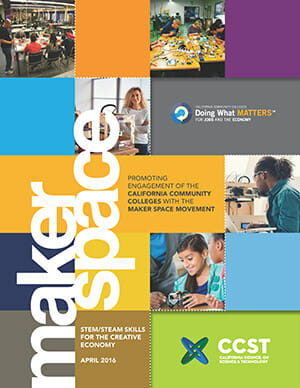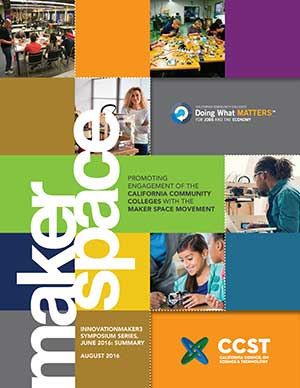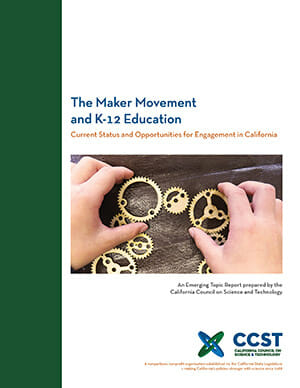Promoting Engagement of the California Community Colleges with the Maker Movement
Author(s): Feinstein, Laura; DeCillis, M. Daniel; Harris, Laurie
Release Date: April 28, 2016 | Last Updated Date: May 9, 2016
ABSTRACT
The Maker Movement is rapidly growing at educational institutions around the world and across age and employment levels, from kindergarten to mid- and late-career. “Making” offers complementary learning environments to the traditional classroom and helps participants develop skills that differ from those developed in traditional student projects and learn-by-doing classes. The spaces housing thee activities are called makerspaces, also sometimes referred to as hackerspaces, hacker labs, or fab labs. Broadly, they are all interdisciplinary, participatory, peer-supported learning environments where people can design and invent among a community of other makers. Yet, there is great variation in the capabilities and foci of makerspaces, ranging from traditional crafts such as woodworking to the use of digital technologies such as 3D printers and laser cutters.
Makerspaces emphasize intrinsic motivation, student-led learning, multiple acceptable products/results, and the process of creating. They are consequently well suited to complement traditional academic environments and link colleges with the regional economy, helping students be competitive in California’s entrepreneurial environment.
In line with the “Doing what MATTERS for Jobs and the Economy” framework, the California Community College Chancellor’s Office (CCCCO) is interested in growing a statewide network of makerspaces linked to California Community Colleges (CCs). At the CCCCO’s request, the California Council on Science and Technology (CCST) was commissioned to develop a report to inform these efforts. CCST has conducted a literature review, background research, and interviews to develop a playbook of considerations and recommendations for establishing a network of makerspaces.The CCCO can help pave the way for the development and sustained support of makerspaces by classifying them as a campus resource, similar to libraries and computer labs. While the setup for individual makerspaces will vary depending on local assessments, the CCCCO can help facilitate communication and collaboration among institutions and stakeholders. A CC-makerspace network can achieve a number of key goals: helping users build 21st century skill sets, including critical thinking, collaboration, and creativity; providing students, faculty, and other users with opportunities to engage with industry; and helping the CCs establish themselves as key stakeholders in the entrepreneurial workforce.





